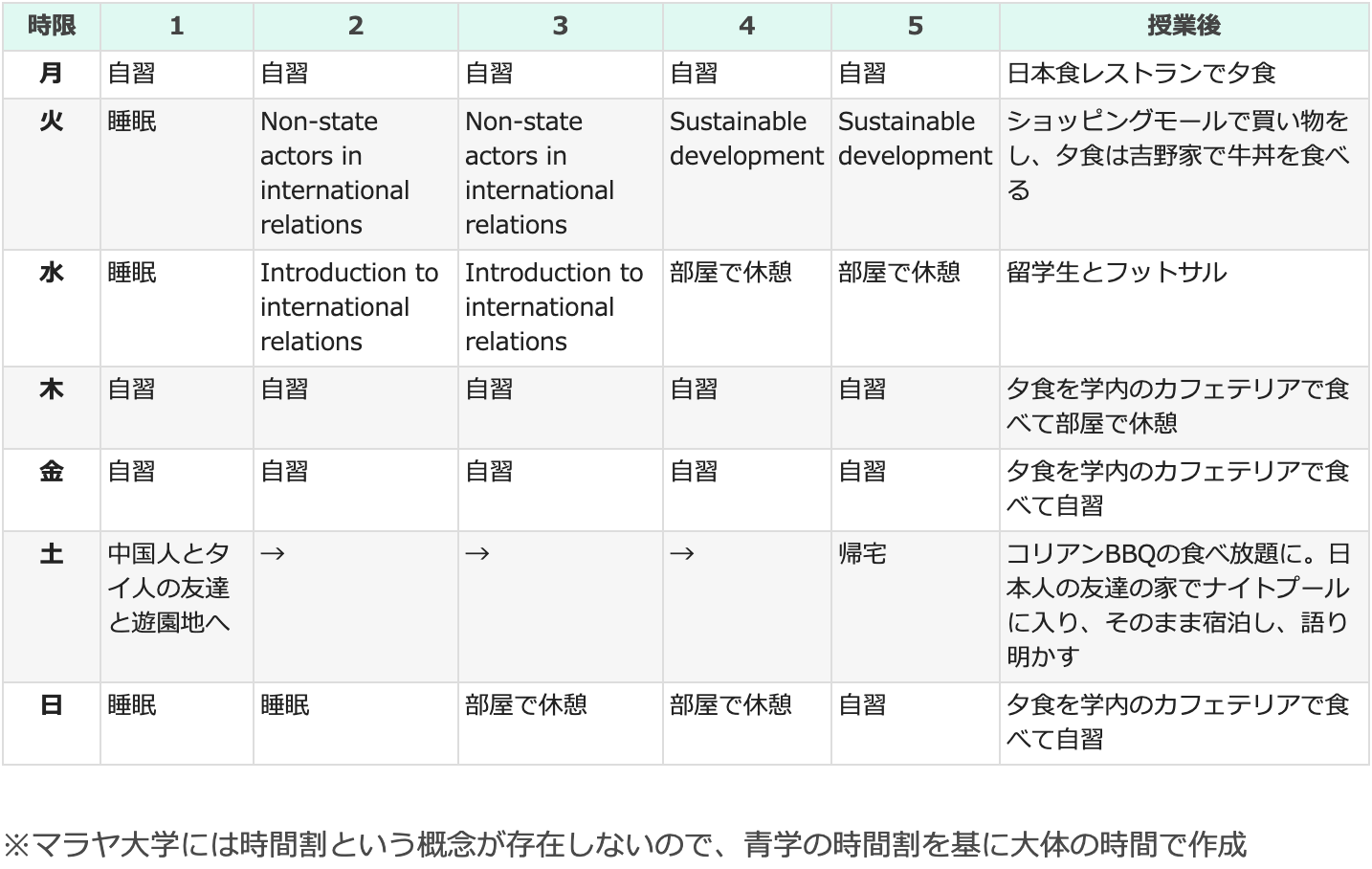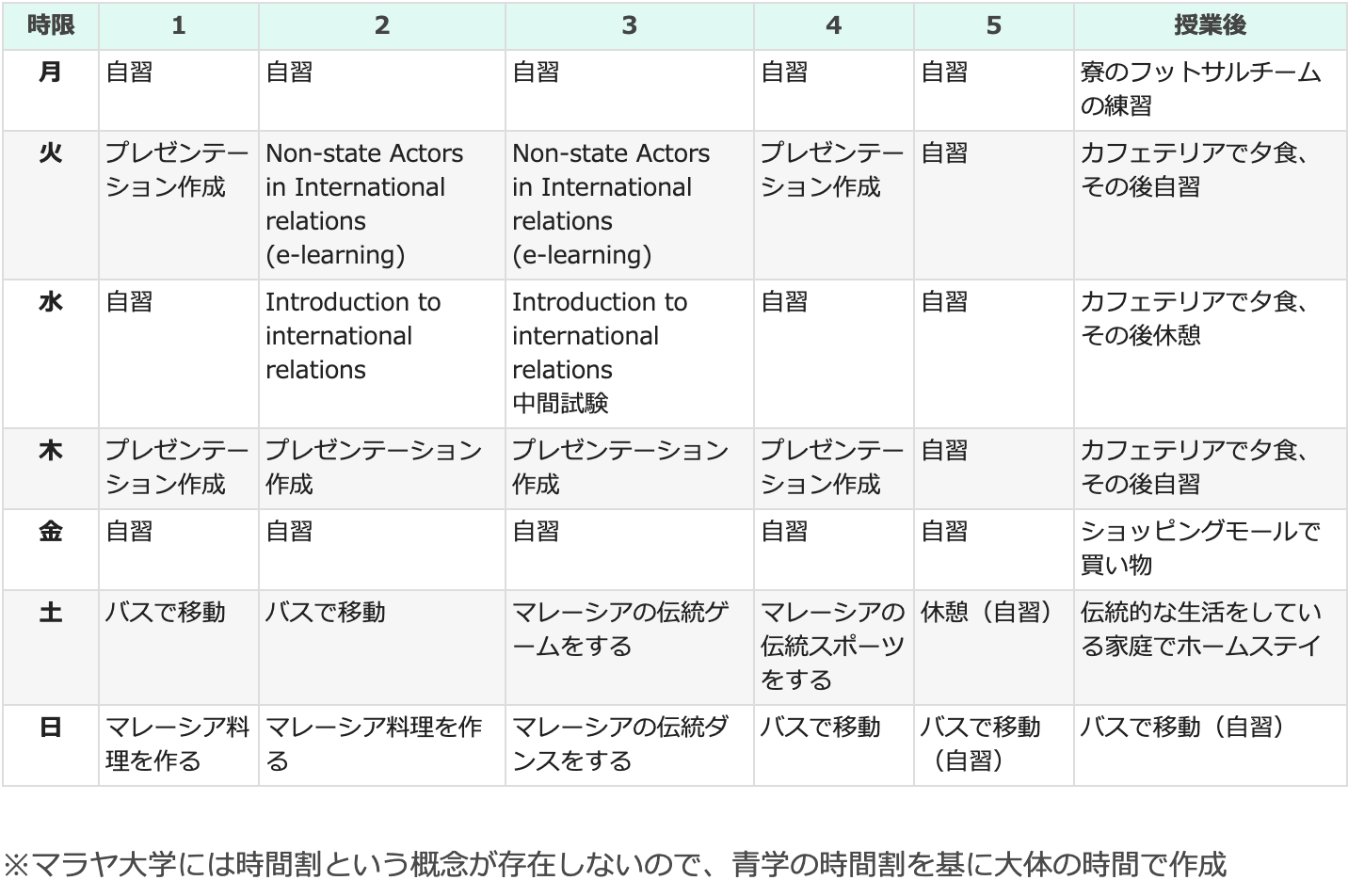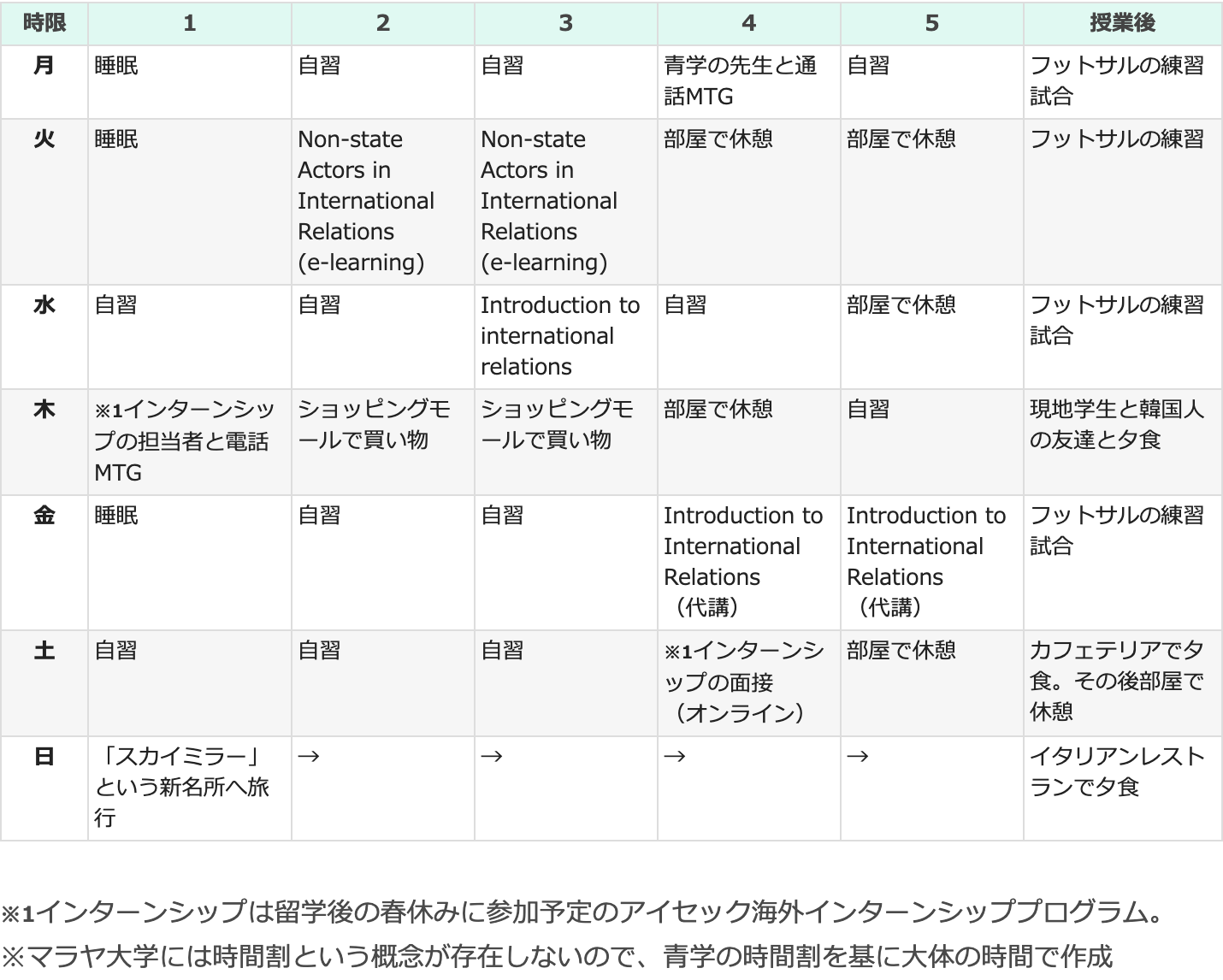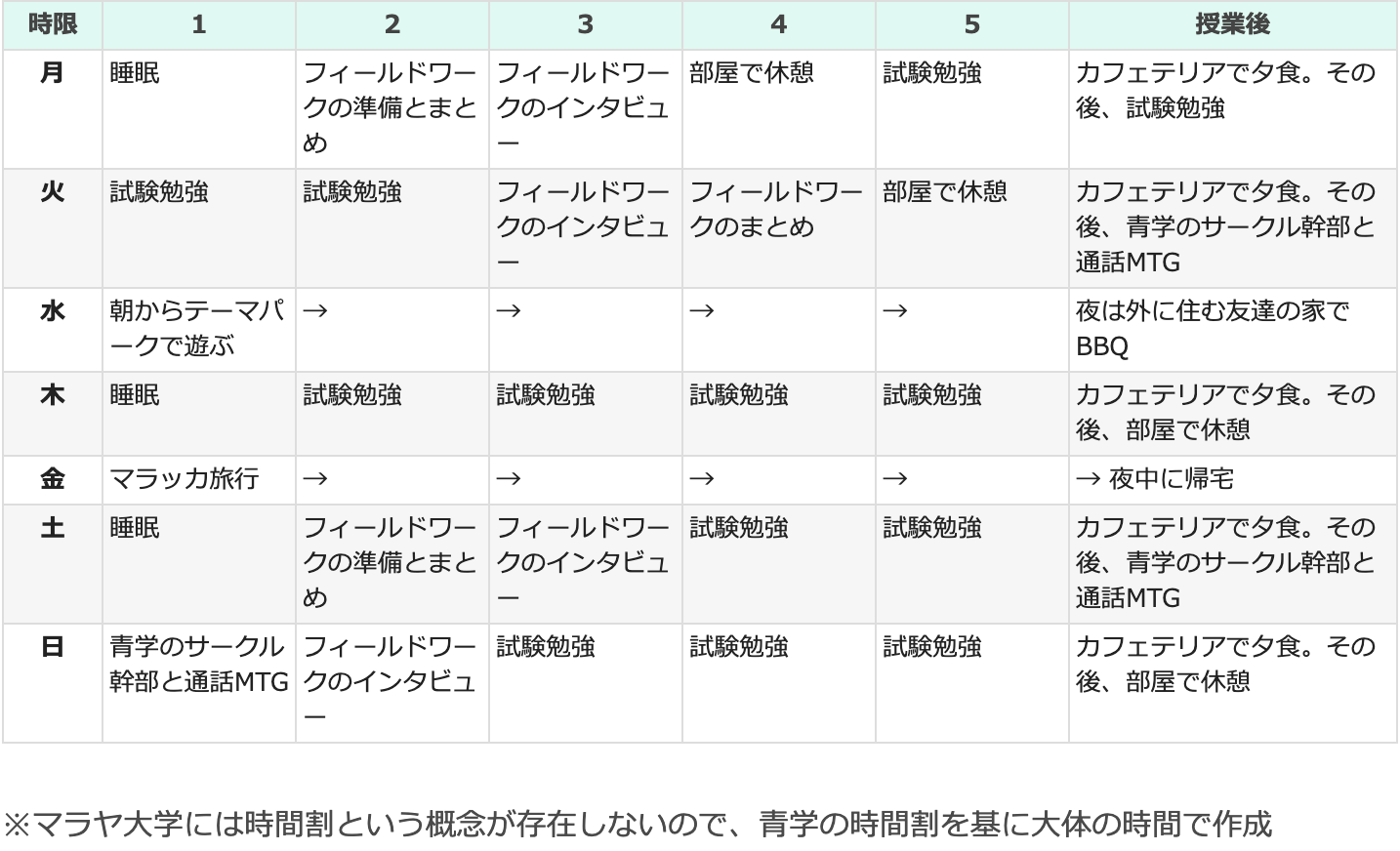- ホーム
- 学部・大学院
- 地球社会共生学部
- 留学(地球社会共生学部)
- 留学生活(地球社会共生学部):学部留学 マンスリーレポート(石塚 彩世)
留学生活:学部留学 マンスリーレポート(石塚 彩世)
- MENU -
学部留学 マンスリーレポート
INTERVIEW 留学直前インタビュー
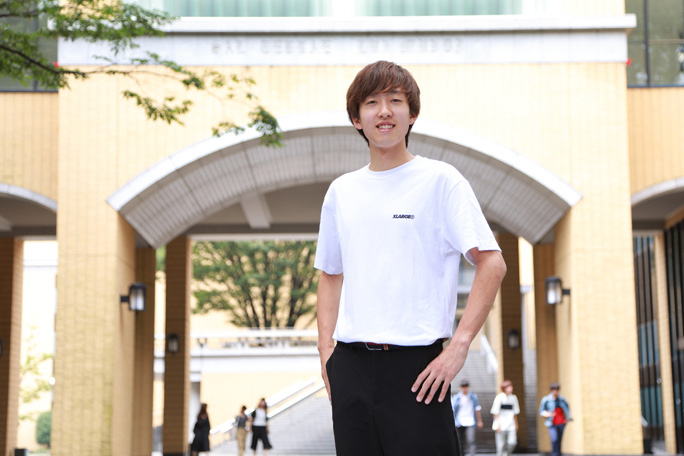
留学を通して将来像が明確になると考えているので、多民族国家の中で自分自身を見つめてきます。
石塚 彩世 2年
神奈川県立厚木高等学校出身
留学先 マレーシア・マラヤ大学
留学期間 2019年9月→2020年1月
-留学先(国・大学)を選んだ理由は?
英語を日常生活で使えることや以前から興味を抱いていたイスラム教についても学べることからマレーシアを留学先に選びました。マラヤ大学を選んだ理由はマレーシアのみならず東南アジア地域を代表する名門大学であり、非常にレベルの高い学生たちから良い刺激を受けられると伺ったからです。また、寮に入った場合は同じ部屋に住む学生が外国人留学生になるので、必ず貴重な体験につながると思い、チャレンジしてみたいと考えました。
-留学に向けて準備したことは?
大きく分けてふたつのことを準備してきました。ひとつ目は英語です。英語にふれる時間を増やし、履修している全科目でわからない単語や表現をリストアップし、自分専用の単語帳を作りました。また、毎日英単語を20分間(専用の有料アプリで)勉強することを心がけました。ふたつ目は専門性を高めることです。そのために先生方から勧められた本を読んで、重要な部分をピックアップして新たにまとめ上げる努力をしました。
-留学で最も期待することは?
多民族国家の雰囲気やイスラム教が根づいた生活を肌身で感じたいと考えています。同時にバックグラウンドが違っても人間として必ず共通する”何か”があるのではないか?と思うので自分なりの視点でそれを探し出したいです。それらとも関連づけながら、自分は将来何をすべきなのか、何を求められているのかを考えていきたいです。
-留学中にチャレンジしたいことは?
他国からの留学生や現地の学生など、日本人以外の人たちと交流を図りたいです。寮生活や食事、イベントなど生活全般をとても楽しみにしています。学業面では授業についていけるのか不安もありますが、レベルの高い授業に積極的に取り組んでいきます。新しいことを学べるだけではなく、自分の力不足や知識不足にショックを受けることにも期待をしています。同学年の学生に格の違いを見せられることで、むしろ勉強に闘志を燃やして取り組めるようになると思うからです。また、旅行をすることが好きなので、穴場の観光スポットなど、こうした機会でなければ足を運べない場所を訪問してみたいです。これまでずっと実家で生活していたため、留学自体が大きなチャレンジですが、「最低限の準備をすればなんとかなる」「完璧にすべてのことをこなすのは無理」など、あえて楽観的になって、これから始まる留学生活を存分に満喫したいと考えています。
石塚さんからの【第1回 現地レポート】は10月中旬予定です!!
MONTHLY REPORT Vol.1 学部留学 マンスリーレポートVol.1
さまざまな言語が飛び交う多国籍キャンパスで、私の留学生活がスタートしています。
マレーシアでの留学生活がスタートした石塚彩世さん。マラヤ大学の様子や日々の生活について現地から第1回目のレポートが届きました!
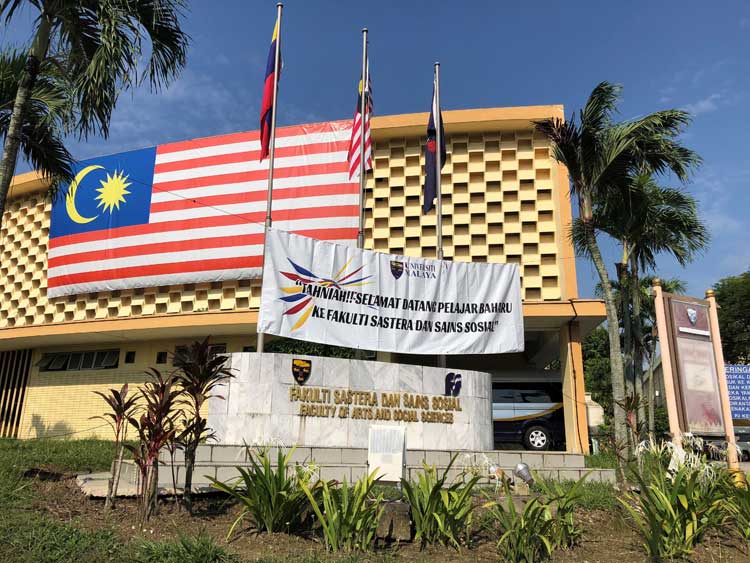
-留学先大学の立地や環境は?
クアラルンプール中心部まではタクシーで30分、電車とバスを使っても45分ほどに位置するマラヤ大学は、相模原キャンパスに比べてとても大きい印象をもちました。学内を縦断するには1時間程度かかるため、学内の移動は路線バスか学内の無料シャトルバス、もしくはタクシーを使います。キャンパス内の施設は充実していて、広い図書館や24時間開放されているスタディールーム、プール、床屋や学生専用の病院などもあります。カフェテリアや各スポーツのコート(サッカー、バスケットボール、テニスなど)は学内のいたるところに配置されています。

-寮生活の印象は?
中国と韓国からの留学生が多いですが、ドイツやイングランドなどヨーロッパからの留学生や少数ですが現地の学生も寮で暮らしています。日本と異なる環境に最初こそ戸惑いましたが、他国の学生と交流を深めながら寮生活をエンジョイ中です。
-キャンパスの雰囲気やチューター、TAなどの留学生へのサポートは?
もともとマレーシアが多民族国家ということもあり、キャンパス内にはさまざまな言語が飛び交っています。留学生だけでも2000人程度いるとのことです。 私たち留学生10名程度に対して現地の学生2名がつくバディグループがあり、最初の2週間はグループ単位で行動し、ビザの申請方法や授業の履修方法を教わりました。また、国際センターの事務所でもスタッフの方々が対応をしてくれるので、安心して留学生活を送れています。
石塚さんの9月の、とある1週間
-学習面でのトピックは?
授業「Non-state actors in international relations」は、2時間の講義と、プレゼンテーションとディスカッションを1時間で行います。授業「Sustainable development」は、マラヤ大学でも有名な気分屋の先生で、よく休講になったり、急に課題が出たりしますが、この日は珍しく時間通り授業が行われました。授業「Introduction to international relations」も2時間の講義と1時間のプレゼンテーションとディスカッションに分かれています。自習の時間は主に「授業内容の復習」「フィールドワークの用意」「授業で行うプレゼンテーションの準備」を中心に取り組みました。
-生活面でのトピックは?
朝食はパンや野菜ジュースを部屋で摂ります。昼食は教室近くのカフェテリアで、夕食は寮の近くにあるカフェテリアで食べることがほとんどですが、たまに街に食べに行きます。カフェテリアはほぼすべてがマレーシア料理とインド料理で、全般的にとてもおいしいです。今週は金曜日から寮の工事のため、私の部屋がある3階が断水する予定でしたが、なぜか木曜日から断水しました(こういったことはよくあるので特に気にしていません)。その期間中は4階のトイレ4つとシャワー3つ(水のみ)を60人で使ったので、シャワーは常に混んでいました!
-アクティビティでのトピックは?
水曜日はイングランド・ドイツ・インドネシア・中国・日本の学生20人ほどでフットサルをしました。前回は現地のフットサルチームの学生も一緒に40人ぐらいでプレイし、試合中に英語でコミュニケーションを取るのが新鮮でおもしろかったです! 土曜日は仲良くなった中国人とタイ人の留学生と一緒に高原にある遊園地に行ってきました。20℃前後とマレーシアとは思えない涼しい場所で、非常に快適でした。
MONTHLY REPORT Vol.2 学部留学 マンスリーレポートVol.2
1日7時間程度勉強する毎日、ホームステイ中もプレゼン準備に追われました。
マレーシアへの留学から1ヵ月が過ぎた石塚さん。現地の生活に慣れたでしょうか?第2回目のレポートが届きました。
石塚さんの10月の、とある1週間
-学習面でのトピックは?
この1週間は中間試験シーズンであり、私の場合はエッセイやプレゼンテーションの時期とも重なったため、ほぼ勉強漬けの毎日でした。平均して毎日7時間程度はマラヤ大学の課題に没頭しました(2週間前からそのような生活を続けていました)。週末は事前に申し込んでいたホームステイプログラムに参加しましたが、その最中でも、空いた時間や移動時間にプレゼンテーションの準備を続けました。
具体的な課題としては、3000 wordsのエッセイ(青学の授業で書いたものの3倍の分量)がふたつ、中間試験がひとつ、30分間のグループプレゼンテーション(3人で1グループ)の準備がありました。特に大変だったのはエッセイで、フォーマットが少しでも崩れたり、引用の仕方を間違えたりすると大幅な減点につながるため、注意して取り組みました。マラヤ大学の教授はもちろん、青学で「Academic English」を担当する先生にもmessengerを通じて相談をし、アドバイスをいただきました。英語の論文の書き方を全く学習してこなかった学生は相当苦労していた、もしくはあきらめていたようでしたが、私は1・2年次の「Academic English」で基礎的な書き方は習得していたので、それを基に応用的なレポートの書き方や知識を身につけることができました。
中間試験については、日本のようなテストは基本的には行われません。私の履修しているクラスでは、40分間でひとつのテーマについてA4用紙3枚以上の作文を書く試験で、記入する内容は1週間前に発表されていました。本のタイトル、作者名などを記憶した上で最低1ヵ所は引用を入れなければならず、日本人からすると経験していないユニークな試験だったと思います。
今週はe-learning weekでしたのでひとつの授業はオンライン受講になりました。事前にグループワークで作成していた動画をYouTubeにアップして、お互いに見て評価し合います。また、先生が挙げた動画を見て、簡単なクイズにも答えました。12月にもう1度e-learning weekがあるようです。
-生活面でのトピックは?
10月になり少し変化があったのは雨期に入ったことです。夕方になると毎日激しい雨が降りました。一度、自分が住んでいる寮に雷が落ちたことがありましたし、落雷で学内の木が倒れたこともありました。
前回は食べ物のことを書いたので、今回はキャンパス内の移動手段についてレポートしようと思います。移動の選択肢としては、「徒歩」「学内のシャトルバス」「路線バス」「タクシー(grab)」「UNiRIDE」があります。まず徒歩についてですが、寮から教室までは徒歩で20分程度かかる上、坂道も多く、炎天下の日中はかなり疲れます。また、スコールが来ると傘は意味をなさなくなり、全身ずぶ濡れになります。ですので、遠くへの移動は主にバスかタクシーを使います。
学内の無料シャトルバスは1時間に1本程度走っていて、寮から教室周辺まで移動できて、かなり便利です。路線バスは15分間隔で走っていて、どこまで乗っても約30円です。学校を一周して最終的には最寄り駅まで行くので頻繁に利用しています。タクシーは割高で、教室まで5分弱で行くことができますが、約180円かかってしまいます。また、学内専用の乗り物として「UNiRIDE」が使えます。これは電動自転車のような乗り物で、学内の好きなところから乗って、好きなところで降りることができます。距離と時間によって変わりますが、料金は1回約30~50円程度で、免許は必要なく、アプリで登録すれば誰でも使えます。
-アクティビティでのトピックは?
この1週間は勉強メインの生活でしたが、寮のフットサルチームの練習には参加しました。マラヤ大学では11月後半から12月前半にかけて、学内にある12の寮対抗のスポーツ大会が開かれます。それぞれのチームが10月から練習を開始しました。種目は20種類程度ありますが、私はサッカーとフットサルに参加しています。すでにサッカーについてはセレクションに合格して、正式にメンバー登録されました。フットサルでは元マレーシア代表コーチの指導のもと、週に3回程度練習しています(この週は中間試験のため1回しかありませんでした)。現在のチームは、マレーシア、日本、中国、韓国、インドネシア、スペイン、イタリア、イングランド、ドイツの多国籍な学生で構成されています。体を定期的に動かせるという点では健康にも良く、また、いろいろな国の学生と英語でコミュニケーションを図ることもできて非常におもしろいです。
週末は以前申し込んだマラッカでのホームステイプログラムに参加しました。日本人は私の他にひとりしかおらず、ほとんどの時間を仲の良い韓国人の友達と過ごしました。野生の猫や犬、ニワトリが多くいるような田舎の村で、マレーシアの伝統ゲームやスポーツ、料理作りを体験しました。マレーシア料理はいつもカフェテリアで食べているものでしたが、作ってみると大変でした。食事もマレーシア伝統のものを食べましたが、お皿の代わりにバナナの葉っぱを使っていたのには驚きでした。ホストファミリーの方は英語があまり話せなかったので、コミュニケーションには少し苦労しましたが、貴重な時間を過ごすことができました。ただ、この間もプレゼンテーション準備に追われていました。
MONTHLY REPORT Vol.3 学部留学 マンスリーレポートVol.3
本格的にフィールドワークを始動させる一方で、フットサルに、話題の観光スポットへ小旅行とマレーシアを満喫。
勉強にフットサルにと、アクティブにマレーシアでの留学生活を送る石塚さんから第3回目の現地レポートが届きました。
石塚さんの11月の、とある1週間
-学習面でのトピックは?
10月に比べると今月は特にヘビーな課題もなかったため、自由に過ごせる時間が増えました。一方で、11月からは本格的にフィールドワークを行い始めました。青学の先生との通話MTGでは調査計画書の内容とインタビューする内容について最終調整を行いました。この週も「Non-State Actors in International Relations」の授業はe-learningでした。また、「Introduction to International Relations」の授業は金曜日に代講が行われました。この週も含め3週間連続で授業の時間がイレギュラーになりましたが、マラヤ大学では授業の時間が変わるのはよくあることです。
-生活面でのトピックは?
ハロウィーンも終わり、11月になると街中にクリスマスの装飾が増え始めます。依然として気温は毎日30度超えですので、日本人からすると少し変な感覚です。 国教がイスラム教なので、クリスマスはそれほど盛大に祝われないものかと思っていましたが、そんなことはありませんでした。
さて、これまでは「食べ物」と「キャンパス内の交通手段」についてレポートしましたので、今回は「マレーシアの大学だからこその、キャンパス内の独特のルール」について書こうと思います。マレーシアでは信教の自由は認められているので、ほかにもさまざまな宗教を信じている人がいますが、国教はイスラム教であり、大学内にもムスリムの方々が多くいるので、基本的にイスラム教のルールに従った校則が学内にはあります。
-アクティビティでのトピックは?
来週末の大会に向けてフットサルの練習と練習試合が週に4回ありました。久しぶりにしっかりと運動をするのでハードな一面もありますが、趣味のスポーツをマレーシアでもできることは大変うれしいです。そして外国人と一緒にプレーすることは私にとって貴重な経験となっています。
木曜日は現地の学生2人と韓国人の留学生2人と寿司を食べに行きました。より日本の味に近い寿司屋を選んで行きましたが、味やネタの種類は少しマレーシア風にアレンジがかかっていておもしろかったです。
日曜日はここ数年で有名になった観光地「スカイミラー」に中国人の友達と日本人の友達と行ってみました。スカイミラーはマラッカ海峡上にあり、干潮時のみ浅くなる地域のことです。ウユニ塩湖のような写真が撮れると話題になりました。海岸から高速船を使い30分ほどで到着します。今回は初めて中国のツアー会社を使ってみました。ツアー会社の人たちが英語を全く話すことができず、中国人の友達がいなければかなりコミュニケーションを取ることが大変でした! ちなみにマレーシアでは中国語も通じますので、第二外国語で中国語を勉強している方でマレーシアに留学したい方はそのまま勉強し続けることをお勧めします。私は半年のブランクがあったのでほとんど忘れていました。それにしても、不思議な写真が撮れた大満足の小旅行でした。
MONTHLY REPORT Vol.4 学部留学 マンスリーレポートVol.4
旅行者としてではなく、ここで暮らしたからこそ見えてきた環境問題は今後のテーマになりそうです。
マレーシアでの留学生活も残りわずかとなった石塚さん。フィールドワークや試験勉強、マラッカ旅行と、充実した日々のレポートが届きました。
石塚さんの12月の、とある1週間
-学習面でのトピックは?
通常の授業はすべて終わり、いよいよSemester1のRevision Weekに入りました。この期間は補講や代講が行われますが、私の履修している授業では何もありませんでした。ですからこの週はフィールドワークの最終調査のインタビューと期末試験対策を同時進行で行いました。1週間後に行われた期末試験についても記入しておこうと思います。
期末試験はほぼ全科目にあり、ほとんどの科目で成績の60%を占めます。試験内容は論述式の問いが3問、時間は120分間です。1つの問いにつきA4用紙3枚以上の記述が最低限、点数を取るために必要です(留学生には甘くしてくれる先生もなかにはいます)。この分量は、しっかり準備をしていないとなかなか厳しいものになります。復習をして、授業でふれた知識を暗記し、それを説明する具体例も考えておく必要があります。ちなみにマラヤ大学には期末試験専用の建物があり、そこに学生が集結して、同時刻に多くの科目が一斉に試験を行います。そのためExamination Hall周辺は渋滞が起こるほどです。私の寮から試験会場までは(同じ学内ですが)歩くと40分ほどかかってしまうのでタクシーで移動しましたが、道が混んでいていつもより時間がかかりました。試験の日程は日本とは大きな違いがあり、大晦日やお正月も関係なくほぼ毎日行われます。
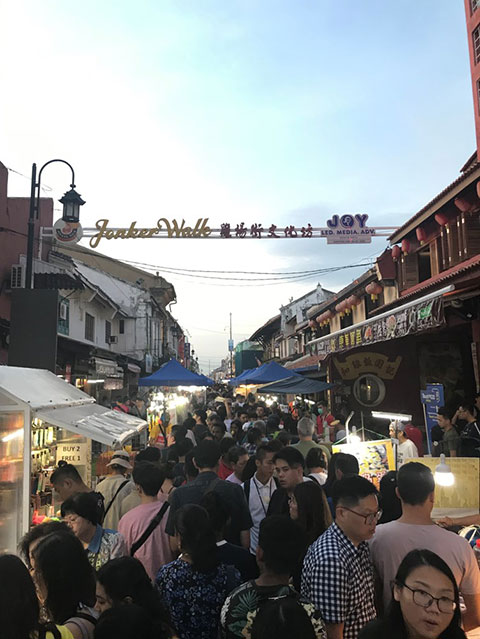
-生活面でのトピックは?
最後は何について書こうかと悩みましたが、ふと思いついた「買い物と環境」について書こうと思います。まず買い物についてですが、日本で手に入るものはほぼすべてマレーシアでも揃うので苦労することはありません。気になる物価ですが、基本的に食品の値段は日本の半額程度です。そのほかのものは、デパートやショッピングモールで購入した場合は日本とほぼ変わりません。つまり、洋服やブランド製品はマレーシアで購入してもあまり安くはないということです。一方で、日本の食品や100円ショップの商品を購入すると、むしろ日本よりも高くなってしまいます。日本の100円ショップの商品はこちらでは約180円程度で売られているので、損をしている気分になります。もし食品以外のものを安く買いたいのであれば、ガイドブックには載っていない地元の人たちが行くマーケットをお勧めします。
「環境」を今回のトピックに加えたのは、どのお店でもレジ袋が有料であるからです。マイバッグをもち歩くのが当たり前の社会になっていて、その姿勢は日本人も学ばなければいけないと思いました。また、マレーシアでは紙のストローをよく見かけました。日常生活の中から環境への配慮を感じることができます。一方で、マレーシアの人々にゴミを分別する習慣はありません。もしかしたら回収された後に分別の作業が行われているのかもしれませんが、不思議でした。すべてのゴミを1つのゴミ箱に捨てることには罪の意識さえ感じました。今思うとこれをフィールドワークのテーマにしてもよかったかもしれません。
(画像:金曜日と土曜日のみ開催されるナイトマーケットで、木で彫られたスマートフォンのケースを500円で買いました(もちろん値引き交渉はしました)。屋台で食べる地元のマレーシア料理や中華料理は安い上にとてもおいしいです)

-アクティビティでのトピックは?
1週間の過ごし方の中で「青学のサークル幹部と通話MTG」というのが3回出てきますので、ここで説明を加えておきます。私は1年次の頃にサッカーサークルを立ち上げ、現在に至るまで代表を務めています(留学中は日本に代理の代表がいます)。そのため、次年度の計画と方針についてはマレーシアにいる間に考え始めなければならず、日本にいる幹部数名と電話で会議をしました。
今週は2日ほど外へ遊びに出かけました。まず水曜日にクアラルンプールのテーマパークにマラヤ大学で仲良くなった日本人だけで行きました。全体的にクオリティが高く、日本にはないようなアトラクションもあり、とても楽しかったです。夜はキャンパス外に住んでいる友達の家でバーベキューをして盛り上がりました。
金曜日にはマラッカ旅行(日帰り)に行きました。マラッカは世界の貿易拠点としてはるか昔から栄えた町です。ポルトガルの占領・植民地支配もこの地から始まりました。また、2008年にユネスコの世界文化遺産に登録されています。クアラルンプールからは長距離バスで2時間ほど(片道約400円)かかります。現地のマレーシア人の友達の故郷がマラッカであり、彼女に1日中案内をしてもらいました。土地勘のある人に案内してもらうと行動に無駄がなく、1日ですべてのスポットを周りきりました。現地の人しか知らないようなスポットにも連れて行ってもらったり、食事もすべておいしかったですし、留学を締めくくる良い思い出になる旅行でした。
INTERVIEW 留学振り返りインタビュー
マレーシアのマラヤ大学での学部留学を終え帰国した石塚さんは今、どのようなことを感じているでしょうか。
留学を振り返っていただき、お話を伺いました。
留学での貴重な時間を経て、 アイデンティティーや根底となる考え方に 大きな変化が生まれました。
レベルの高い学生たちから良い刺激を受けられると考え、マラヤ大学を留学先に選びました。実際に授業が始まると学問的知識、英語力の両面で現地学生や他国の留学生に後れを取っていると自覚し、これでは世界レベルでの競争に勝てないと思い知りました。そのことがより勉学に励むためのモチベーションになったことは言うまでもありません。寮生活はとても楽しく、他国からの留学生と交流するには最高の環境でした。寮生で結成したサッカーとフットサルのチームに参加し、いろいろな国の学生と英語でコミュニケーションを図ることが新鮮でおもしろかったです。”スポーツに国境はない”ということを実感しました。
留学を振り返って思うことは、学部の名前の一部にもなっている『共生』がすごく難しいことであるということです。他の国の人々や他の文化を持つ人々と生活するときには、時に『自分にとっての当たり前が当たり前に通じない感覚』を感じることになります。留学中ほとんどの時間は楽しいものでした。しかし時には誰かと意見がぶつかったり、イライラしたり、理解できないこともありました。そんな時に改めて、『共生』、ましてや『地球規模の共生』とは難しいものだと痛感しました。しかし、世界は今後さらに『協調』『協力』していかなければならないのもまた事実です。『共生』という難しいテーマに対し、更なる努力が必要であることを強く感じております。同時に、私自身のアイデンティティーや根底となる考え方が変わったような実感も持っています。
マレーシアで出会った人々は様々な場面で私を助けてくれました。この力添えに感謝の意を示し、残りの2年でさらに自分自身を磨きたいと思っております。
